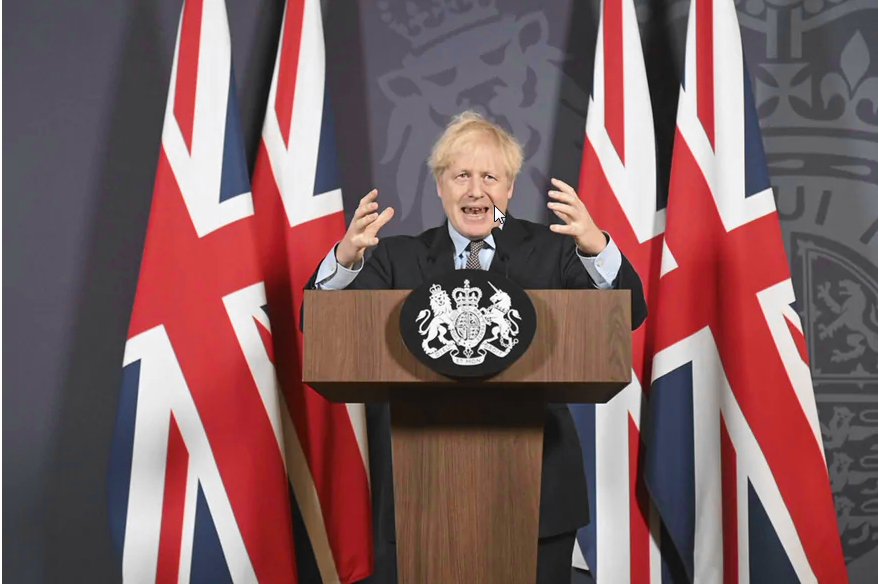British Prime Minister Boris Johnson announces a deal on December 24 Paul Grover Britain has finally negotiated a deal with the European Union. The European Court of Justice will not act as a court of arbitration. Some Swiss voices are now calling for Switzerland to get the same deal. This content was published on December 28, 2020 – 13:51December 28, 2020 – 13:51 Sibilla Bondolfi The UK and the EU managed to agree on a last-minute trade deal after all. It will come into force provisionally on January 1. This will prevent customs duties being imposed on exports and imports in the new year. Free trade without EU membership: that sounds like what British Prime Minister Boris Johnson was after, and something he’ll try to sell as a victory at home. The British
Topics:
Swissinfo considers the following as important: 3.) Swiss Business and Economy, 3) Swiss Markets and News, Featured, newsletter
This could be interesting, too:
Nachrichten Ticker - www.finanzen.ch writes Die Performance der Kryptowährungen in KW 9: Das hat sich bei Bitcoin, Ether & Co. getan
Nachrichten Ticker - www.finanzen.ch writes Wer verbirgt sich hinter der Ethereum-Technologie?
Martin Hartmann writes Eine Analyse nach den Lehren von Milton Friedman
Marc Chandler writes March 2025 Monthly
Britain has finally negotiated a deal with the European Union. The European Court of Justice will not act as a court of arbitration. Some Swiss voices are now calling for Switzerland to get the same deal.
This content was published on December 28, 2020 – 13:51
The UK and the EU managed to agree on a last-minute trade deal after all. It will come into force provisionally on January 1. This will prevent customs duties being imposed on exports and imports in the new year.
Free trade without EU membership: that sounds like what British Prime Minister Boris Johnson was after, and something he’ll try to sell as a victory at home. The British have also managed to talk the EU out of using the European Court of Justice (ECJ) as a court of arbitration. Instead, a partnership-based body is to rule on disputes. And the Brexit deal does not include the automatic adoption of EU law.
However, despite the deal uncertainty hangs over huge chunks of the relationship between Britain and the EU. The agreement covers trade in goods, but it leaves the UK’s huge financial services sector in limbo, still uncertain how easily it can do business with the bloc after January 1.
‘No submissiveness’
Switzerland has been negotiating an institutional framework agreement with the EU for years, involving similar questions to Brexit. The negotiations have been mutually influential.
Now the Brexit deal is making people envious in Switzerland. Speaking to Swiss public radio, SRF, Hans-Peter Portmann from the centre-right Radical-Liberal Party demanded that the government include the Brexit deal in the next talks with the EU in January and “not go below the level that Britain has now”.
Roger Köppel of the right-wing Swiss People’s Party tweeted: “Boris Johnson got it right. Negotiated hard, no submissiveness, deal reached – without foreign lawmakers and foreign judges.”
Autonomiesuisse, a committee of entrepreneurs, wrote in a statement that the Brexit deal gave Switzerland new room for manoeuvre in negotiations with the EU. This is because the UK has asserted its interests on key points, it said.
“Overall, the sovereignty policy issues in the Brexit negotiations were largely settled in the way Autonomiesuisse is seeking for the Switzerland-EU framework agreement,” it said. “The Brexit agreement shows that there is potential for negotiation with Brussels.”
Apples and oranges
But there are also voices that put things into perspective. According to European law professor Christa Tobler, the Brexit deal is not comparable to the Swiss framework agreement.
“Once again, people are comparing apples and oranges,” she told newspaper Blick. The UK’s relations with the EU are much less close than those of Switzerland, which is to some extent part of the enlarged EU single market and applies EU law, she said. “Therefore the EU would not accept the ECJ not having a role concerning Switzerland.”
Cenni Najy, vice-president of the foreign policy think tank Foraus, agreed in Le Temps that a parallel could not be drawn between the Swiss framework agreement and the Brexit deal. “Switzerland wants a solution in which all trade barriers are abolished. The UK, on the other hand, has concluded a lose-lose agreement whose full consequences are not yet clear,” he said.
The Swiss government is expected to give its first reaction to the Brexit deal on Wednesday.
(Translated from German by Thomas Stephens)
Tags: Featured,newsletter










